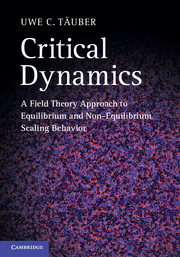Book contents
- Frontmatter
- Dedication
- Contents
- Preface
- Part I Near-equilibrium critical dynamics
- Part II Scale invariance in non-equilibrium systems
- 8 Non-equilibrium critical dynamics
- 9 Reaction-diffusion systems
- 10 Active to absorbing state transitions
- 11 Driven diffusive systems and growing interfaces
- Index
- References
11 - Driven diffusive systems and growing interfaces
from Part II - Scale invariance in non-equilibrium systems
Published online by Cambridge University Press: 05 June 2014
- Frontmatter
- Dedication
- Contents
- Preface
- Part I Near-equilibrium critical dynamics
- Part II Scale invariance in non-equilibrium systems
- 8 Non-equilibrium critical dynamics
- 9 Reaction-diffusion systems
- 10 Active to absorbing state transitions
- 11 Driven diffusive systems and growing interfaces
- Index
- References
Summary
The emergence of generic scale invariance, i.e., algebraic behavior without tuning to special critical points, appears to be remarkably common in systems that are settled in a non-equilibrium steady state. Prototypical examples are simple non-linear Langevin equations that describe driven diffusive systems and driven interfaces or growth models far from thermal equilibrium, whose distinct phases are characterized by non-trivial RG fixed points and hence universal scaling exponents. We start with driven lattice gases with particle exclusion that are described by generalizations of the one-dimensional noisy Burgers equation for fluid hydrodynamics. Symmetries and conservation laws completely determine the ensuing stationary power laws, as well as the intermediate aging scaling regime and even the large-deviation function for the particle current fluctuations. Next we address the non-equilibrium critical point for driven Ising lattice gases, whose critical exponents can again be computed exactly. We then turn our attention to the prominent Kardar–Parisi–Zhang equation, originally formulated to describe growing crystalline surfaces and the dynamics of driven interfaces, but also closely related to the noisy Burgers equation and even to the equilibrium statistical mechanics of directed lines in disordered environments. After introducing the scaling theory for interface fluctuations, we proceed to a renormalization group analysis at fixed dimension d. For d > 2, a non-trivial unstable RG fixed point separates a phase with Gaussian or Edwards–Wilkinson scaling exponents from a strong-coupling rough phase that is inaccessible by perturbative methods.
- Type
- Chapter
- Information
- Critical DynamicsA Field Theory Approach to Equilibrium and Non-Equilibrium Scaling Behavior, pp. 443 - 498Publisher: Cambridge University PressPrint publication year: 2014

